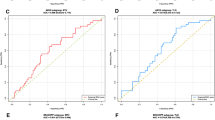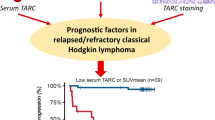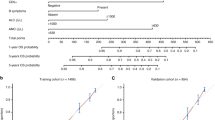Abstract
The efficacy of currently available treatments for Hodgkin's disease (HD) has led to a substantial modification in the prognosis of this disease; nevertheless there is still a group of patients that cannot be cured with conventional treatments and who will be candidates for alternative therapy. In the present work we analysed the prognostic influence of the most relevant clinico-biological characteristics of HD in a consecutive series of 137 patients diagnosed and treated in a single institution. Univariate analyses identified six variables with significant prognostic influence, both on achieving complete remission (CR) and overall survival (OS); LDH > 320 U ml-1, age > 45 years, stages IIB, III and IV, extranodal involvement, alkaline phosphatase > 190 UI dl and ESR > 40 mm h. In addition, Hb < 12.5 gr dl-1 and abdominal disease were statistically relevant for CR while a poor performance score (ECOG > or = 2) affected a lower survival. In the multivariate analysis only LDH, age and the clinical stage retained a significant prognostic influence for achieving CR, while the two first factors above, together with performance status were the variables with independent prognostic value with respect to OS. Moreover, only LDH > 320 U ml-1 had prognostic influence in the probability of relapse and disease free survival (DFS), both in the univariate and multivariate analyses. According to the three independent factors obtained in the multivariate analysis for CR (LDH, age and stage) a predictive model was established that allows the stratification of patients into two prognostic groups: one with poor prognosis that includes patients with the three adverse prognostic factors, or two if one of them was elevated LDH, and the other with good prognosis that includes the remaining patients. This model was also able to separate two independent groups of patients with respect to OS and to DFS. In conclusion, the present study shows that LDH is one of the most important prognostic factors in HD.
This is a preview of subscription content, access via your institution
Access options
Subscribe to this journal
Receive 24 print issues and online access
$259.00 per year
only $10.79 per issue
Buy this article
- Purchase on Springer Link
- Instant access to full article PDF
Prices may be subject to local taxes which are calculated during checkout
Similar content being viewed by others
Author information
Authors and Affiliations
Rights and permissions
About this article
Cite this article
García, R., Hernández, J., Caballero, M. et al. Serum lactate dehydrogenase level as a prognostic factor in Hodgkin's disease. Br J Cancer 68, 1227–1231 (1993). https://doi.org/10.1038/bjc.1993.509
Issue Date:
DOI: https://doi.org/10.1038/bjc.1993.509
This article is cited by
-
Development and validation of prediction model for overall survival in patients with lymphoma: a prospective cohort study in China
BMC Medical Informatics and Decision Making (2023)
-
Identification of acetyl-CoA carboxylase alpha as a prognostic and targeted candidate for hepatocellular carcinoma
Clinical and Translational Oncology (2023)
-
The multiple roles of LDH in cancer
Nature Reviews Clinical Oncology (2022)
-
High lactate dehydrogenase at time of admission for allogeneic hematopoietic transplantation associates to poor survival in acute myeloid leukemia and non-Hodgkin lymphoma
Bone Marrow Transplantation (2021)
-
Reappraisal of the prognostic value of Epstein-Barr virus status in monomorphic post-transplantation lymphoproliferative disorders–diffuse large B-cell lymphoma
Scientific Reports (2021)



